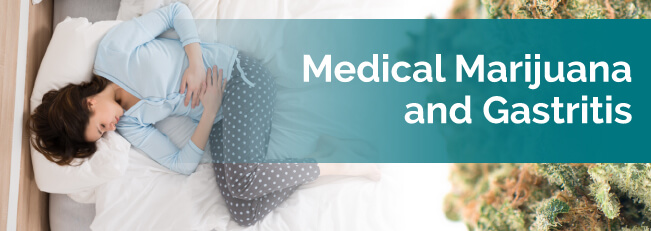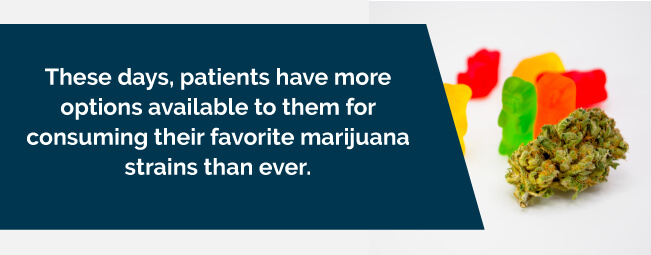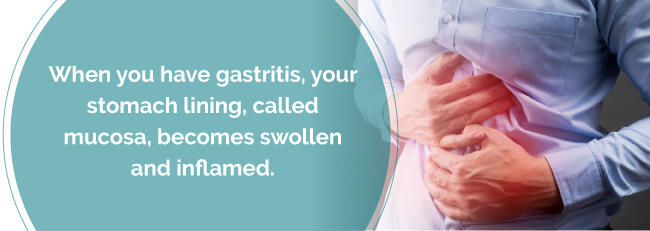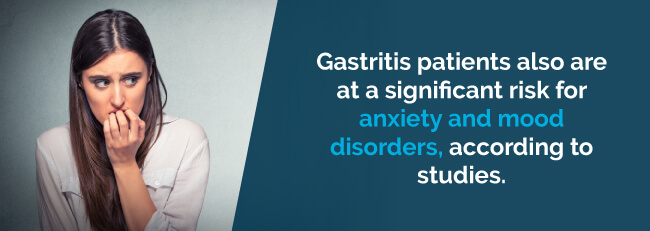
Many people take having the ability to absorb nutrients and a healthy digestive system for granted. But, for those who have gastritis, life isn’t as simple. And, if you have the condition, you know it can be a life-altering impairment and dramatically reduce your day-to-day quality of life. The good news: now, you can add medical cannabis for gastritis to the growing list of potential treatments for this condition.
Gastritis can be a serious condition that significantly reduces a patient’s quality of life. Traditional treatment for gastritis strives to eliminate the causes and provide the patient with relief from the symptoms. Antacids and proton pump inhibitors, however, can have some serious long-term use side effects that eventually lead to even more severe health concerns.
These drugs typically come with disclaimers to warn the patient to discontinue use after a relatively short period — and for good reason. These drugs act by either removing or neutralizing the acid produced in the stomach. When acid is eliminated or reduced, however, the patient’s general health declines because the body can’t properly absorb essential nutrients.
Medical marijuana offers many of the benefits of conventional gastritis treatment options but without the adverse side effects. Medical marijuana has long been known to stimulate the appetite as well as reduce nausea and vomiting. Also, medical marijuana also offers anti-inflammatory benefits to help reduce the inflammation in the stomach caused by gastritis.
Find A Doctor Find A Dispensary
Clinical studies have repeatedly shown that marijuana acts as an appetite stimulate. Time and time again, studies on cancer patients who have lost their appetite due to chemotherapy have shown medical marijuana does, indeed, act to stimulate the desire for food. Also, these same studies have shown cannabis works to reduce nausea and vomiting.
A long-term study conducted from 1975 through 1996 concluded medical marijuana is at least as effective, if not more effective, than traditionally prescribed drugs used to treat nausea. For anyone suffering from gastritis, the road to recovery must include eating right and providing the body with proper nutrients. Medical marijuana can help the patient by sparking the desire to eat and reduce the possibility of feeling nauseous or vomiting after eating or between meals.
Along with combating nausea, vomiting, and the loss of appetite you can experience with gastritis, medical cannabis may be helpful in treating the stomach itself. Medical marijuana has also been shown to be an effective anti-inflammatory drug. Medical marijuana contains Cannabidiol, or CBD, an essential component of marijuana which has been shown to have anti-inflammatory properties.
Along with CBD, medical cannabis has been shown to reduce tissue inflammation as a result of the presence of the compound β-caryophyllene. Both CBD and β-caryophyllene work to reduce inflammation in the stomach of a gastritis sufferer, without the side effects caused by antacids and proton pump inhibitors.
The Bath and Bristol University ran a study in 2001, which revealed that digestive system CB1 and CB2 receptors respond to natural cannabinoids, reducing muscle spasm pain, slowing down gut motility and reducing the chances of diarrhea occurring.
When there’s damage to your gut, it’s thought receptors in your gut help the healing process. During the study, the researchers induced gut inflammation intentionally and then added cannabinoids. The results showed that the treatment worked.
Common symptoms of gastritis include:
As you’ve seen through the literature, medical cannabis can treat most if not all of these symptoms. Medical marijuana for gastritis can also help ease the mental effects gastritis may bring on such as anxiety, depression and panic attacks.
It even goes so far as treating the side effects of gastritis medications like headaches, insomnia, and other sleep problems and sexual problems.

The therapeutic dose of cannabis depends on the amount you want to use and should use. So, if you smoke marijuana on a daily basis, you may require an entire joint to ease your pain, whereas being a newbie, you may only need a couple of puffs.
The strain of marijuana you pick is just as important, and you should tailor it to your symptoms. For instance, sativa strains are typically thought to give you more energy, increase immunity and not send you to the fridge looking for food.
Indica strains, on the other hand, offer more painkilling abilities, and they are also a considerable appetite booster. If you’re looking for all the benefits cannabis provides, try a hybrid strain rich in CBD. For gastritis, strains like Trainwreck, Strawberry Haze, and Super Lemon Haze should do the trick.
Other strains you may want to try for the more general symptoms like nausea, inflammation, pain, appetite, depression, and anxiety include:
One of the primary medical uses of weed is to increase the appetite and treat nausea. Nausea can occur for many reasons. Many gastritis treatments cause nausea. To help ease this side effect, try these strains below.
Inflammation occurs due to a wide range of chronic illnesses. Medical cannabis can help, fortunately. When you’re struggling with gut inflammation, medical pot can offer you significant relief. These are suitable weed strains for treating inflammation.
Medical marijuana is often used for pain, whether it’s headaches, inflammation, abdominal pain, neuropathic pain, muscle soreness or something else. Depending on the intensity and type of pain they experience, patients see varying degrees of success with using marijuana to treat their pain. Some great strains for pain relief include:
For those who are seriously ill and are suffering a lack of appetite because of their illness, medications or for other reasons, an increase in appetite is life-saving. If you lack an appetite, try these strains.
While you may not agree with it, many individuals self-medicate with weed to relieve their symptoms of depression. Studies even suggest an association between your body’s endocannabinoid system and depression, which could explain why there are many people prefer marijuana over pharmaceutical alternatives. These strains should help if you’re struggling with depression due to your gastritis condition.
It can be tough living with anxiety. Taking prescription medications can worsen your symptoms. They might not help at all. Fortunately, on top of cannabis’s long list of ailments it treats, is anxiety. Some strains that may be beneficial to you are as follows.
These days, patients have more options available to them for consuming their favorite marijuana strains than ever. From vaporizing and smoking to concentrates, tinctures and topicals, there’s a method for using medical cannabis for everyone — even those individuals who need to maintain discretion due to unapproving landlords, co-workers or housemates. Even if you have respiratory issues or pain, there is a marijuana ingestion method that meets your needs.

Methods of use may include:
As you can see, you have plenty of options out there to reap the benefits of medical weed for gastritis treatment. Your next step is to search for a medical marijuana dispensary or find a doctor. You can then obtain your marijuana card and find a dispensary to get your marijuana to help treat your gastritis symptoms.
Find A Doctor Find A Dispensary
When you have gastritis, your stomach lining, called mucosa, becomes swollen and inflamed. Your mucosa contains glands responsible for generating a pepsin enzyme and stomach acid. The acid in your stomach breaks your food down while pepsin digests the protein. You have a thick mucus layer coating the lining of your stomach and helps keep your stomach tissue from being dissolved by the acidic digestive liquid.

When the lining of your stomach becomes inflamed, it generates fewer enzymes and less acid. But, it also produces less mucus and other materials to keep your stomach lining protected from the acidic digestive liquid.
You can develop two types of acute and chronic gastritis.
Acute gastritis is a swelling or inflammation of your stomach lining. It may cause nagging and severe pain. It can come on suddenly, but the pain is usually temporary and only lasts for quick bursts at a time.
It may also occur due to ingesting irritants like:
While acute gastritis occurs suddenly and lasts only temporarily, chronic gastritis appears more gradually and lasts longer.
Chronic gastritis occurs when the lining of your stomach becomes inflamed.
Your stomach lining can change when this inflammation occurs, and it loses some of its protective cells. Inflammation can also lead to early satiety, which is when your stomach feels full when you’ve only had a few bites of food.
Since this type of gastritis occurs over a gradual period, it wears away at the lining of your stomach slowly. It may cause dysplasia or metaplasia. Both are precancerous cell changes potentially leading to cancer if not treated.
With treatment, however, chronic gastritis typically gets better, although you’ll likely need ongoing monitoring.
Some individuals with a damaged stomach lining may develop reactive gastritis.
Reactive gastritis may:
Reactive gastropathy is another name for reactive gastritis when it causes no inflammation or very little.
Gastritis may also be either erosive or non-erosive:
Certain irritations, such as chronic vomiting or anti-inflammatory drugs, can cause gastritis. However, there are other causes as well including:
When you leave gastritis untreated, it may increase your risk of stomach cancer and lead to severe blood loss.
Researchers have known about and have been studying chronic gastritis since the 20th century in earlier decades. However, the condition didn’t receive much attention until 1982 after Warren and Marshall discovered Helicobacter pylori.
There’s been a noticeable decline in the prevalence of chronic gastritis during the past decades in developed populations. But, it’s still among the most common severe pandemic infections with serious death consequences like gastric cancer and peptic ulcer. Worldwide, on average, over half of individuals could presently have chronic gastritis.
Just about everybody has experienced stomach irritation and indigestion. Typically, these don’t require medical care and are short-lived. If your symptoms of gastritis last longer than a week, or you still feel discomfort after taking an over-the-counter (OTC) or prescription pain reliever, see your doctor.
Gastritis patients also are at significant risk for anxiety and mood disorders, according to studies. After accounting for gender, age, and socioeconomic status, researchers of the study found gastritis patients were substantially more at risk than the general population for panic attacks, anxiety disorder, mood disorder, major depression and social phobia in the past 12 months.

Statistics regarding gastritis reveal:
Gastritis treatment depends on the cause of the condition. For instance, when alcohol or anti-inflammatory drugs cause acute gastritis, the treatment would typically be to stop using those substances.
Some gastritis medications include:
Antibiotics kill H. pylori. When you have H. pylori in your digestive tract, your physician may prescribe a combination of antibiotics, like amoxicillin and clarithromycin or metronidazole, to kill the bacteria. However, you have to take the full prescription.
These medicines promote healing by blocking acid production. Proton pump inhibitors prevent the cell action of producing or reducing acid. Both OTC and prescription PPI medications include:
When you use PPIs long-term, especially at high doses, you could increase your risk of wrist, hip and spine fractures. Calcium supplements may help reduce this risk.
These medications, also known as histamine (H-2) blockers, reduce how much acid releases into your digestive tract and encourages healing and relieves gastritis pain. These medications are available in OTC or prescription medications and include Pepcid, Zantac, Axid AR, and Tagamet HB.
Antacids help to neutralize stomach acid. Your physician may include these in your treatment plan. While neutralizing stomach acid, they may even provide you with fast pain relief. Side effects of antacids may include diarrhea or constipation, depending on their primary ingredients.
You might get some relief from your symptoms if you:
Your first step is to make an appointment with your doctor if you suspect you have gastritis. They will give you an exam, and if they suspect you have gastritis, they may refer you to a gastroenterologist, which is a digestive disorder specialist.